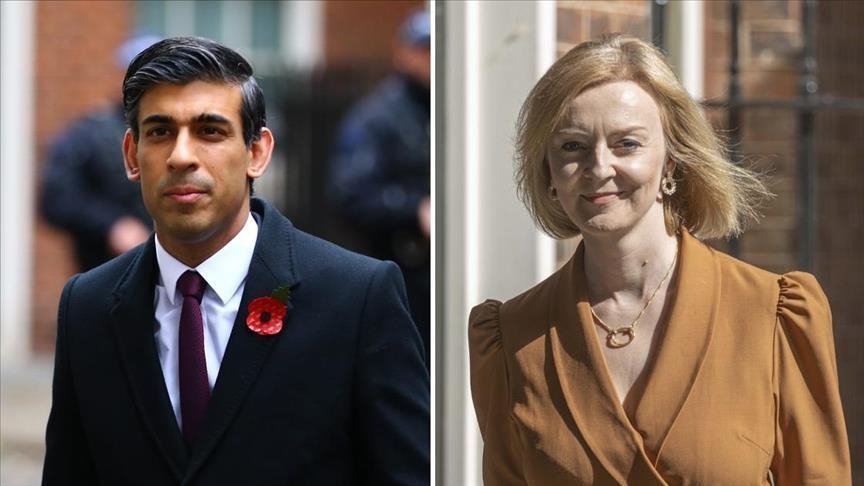
#Liz #Truss #Rishi #Sunak #clash #final #leadership #debate https://www.globalcourant.com/liz-truss-rishi-sunak-clash-in-final-uk-leadership-debate/?feed_id=18513&_unique_id=631003ec89cbb

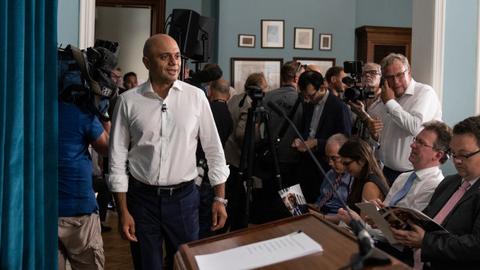
Several British and international media outlets and pundits have commented recently on how the ongoing Tory leadership race was “surprisingly” diverse as the party fielded a number of candidates of colour who hail from minority backgrounds.
Indeed, in the final leg of the race stands Rishi Sunak, the Indian origin former chancellor who, since betraying his old boss Boris Johnson, now seeks to take the top seat at Downing Street.
These pundits are perhaps only surprised by Tory diversity because of a history of racism that has tainted the party to the extent that it has merited the authoring of several books.
Johnson himself is no stranger to allegations of racism, particularly the racialised abuse he heaped on Muslim women who cover themselves - he compared them to bank robbers and letterboxes. That outburst led to a 375 percent spike in anti-Muslim incidences in the week after he made those hateful remarks.
In a party such as this, how is it that it is fielding contenders from diverse ethnic backgrounds for the post of prime minister? Are the Tories simply misunderstood? Or is there something else at play?
Pandering to the base
The answer, of course, is whiteness. Before we press on, it is important to caveat that I am not blaming white people writ large for all the ills of the world. Rather, I am talking about a concept, one that thrives on the insecurities of those seeking a greater station in their adoptive home - the UK - far from their brown or black origins.
Take the former home secretary and chancellor, Sajid Javid, for instance. As a Tory politician from a Pakistani Muslim background, Javid has reached well beyond what many British Muslims can hope to achieve. He rose the social ladder despite job discrimination against Muslim men and women and anti-Muslim attitudes reaching unprecedented levels in recent years. He has held several senior offices of state, and has even vied for the government’s top job.
Yet there is a reason why many British Pakistanis speak of him in unflattering terms, referring to him as a “coconut”, “Uncle Tom”, and a “House Muslim” – leading the politician to rant that he was being subjected to racist abuse through the use of these terms, likely in order to silence criticism and debate from the community he has repeatedly claimed he is representative of.
Javid has long been known to downplay his Pakistani identity, and especially his Muslimness. He has gone out of his way to talk about how his family tradition is to “snog” under mistletoe every Christmas and to say that he practises no religion, which is of course entirely his right. However, if he chooses to abandon his Muslim identity and heritage, he is then similarly disqualified from commenting on anti-Muslim hatred as a “native” in order to provide cover to his Tory colleagues, including Johnson.
Yet Javid did so, once more donning the Muslim cloak during an interview with Andrew Marr in 2019 in order to contradict another British Muslim Tory politician, Baroness Sayeeda Warsi, who has repeatedly gone on the record criticising her own party for having an anti-Muslim sentiment.
Returning to prime ministerial frontrunner Rishi Sunak, again we find many examples of how this son of African Hindu migrants of Indian origin has done his level best to pander to the baser instincts of the Little Englanders that he thinks his future prospects rely on, all while playing up his East African and Indian roots in campaign videos.
Despite Sunak and his family being obvious beneficiaries of immigration that gave him so many opportunities in the United Kingdom and elsewhere, Sunak was not only avidly pro-Brexit – with all the tropes that campaign relied on by portraying Britain being at breaking point – but has since doubled down with anti-migrant rhetoric, pledging to crackdown on migration while doubling the number of foreigners deported over minor crimes. While getting rid of a criminal element is never a bad thing, there are distasteful undertones here, especially as the UK migration system is already infamous for its lack of fairness and its discriminatory policies.
Sunak has also gone a step further, targeting Muslims in yet more dogwhistle anti-Muslim hatred by vowing to widen the definition of “Islamist terrorism” and would add “vilification” of the UK to the definition of extremism if elected by the party membership. In other words, and if Sunak had his way, many of us who have actively criticised British foreign policy and military adventurism in Afghanistan, Iraq and elsewhere could find ourselves being accused of vilifying our country and being branded as extremists, deserving of punishment.
Diversity as a masquerade
There are obviously a number of reasons why people like Sunak and Javid behave the way they do, but primary among them is the quest for acceptance in a society where they have frequently been exposed to racist abuse, with both having described the pain it causes.
Rather than stand up to that racism, taking advantage of their positions of power and influence to ensure it not only does not happen to them again, but is stamped out wherever it is found across society, these politicians have instead decided that racism is part and parcel of the system they have aligned themselves with and continue to seek to serve.
They have internalised these racist attitudes that have stung them personally so deeply, and normalised it to such a degree that they not only cover up for them, but they also engender them by proposing new policies, each more radical than the next, in a desperate attempt to prove that they are not as brown – in the cases of the two men mentioned above – as their chosen audience thinks they are. They are malleable. They know how to “get with the programme”. They will desperately try to prove that, even as prime minister, they will know their place and will not rock the boat.
Far from the Tories being diverse, they have in fact only shown that there truly is a glass ceiling in British politics for people of colour and different cultural and religious beliefs that do not align with the white establishment. Their most diverse candidates are positively falling over themselves to prove how assimilated rather than integrated they are, simply showing that, after all, you really can have different shades of white.
Disclaimer: The viewpoints expressed by the authors do not necessarily reflect the opinions, viewpoints and editorial policies of TRT World.
We welcome all pitches and submissions to TRT World Opinion – please send them via email, to opinion.editorial@trtworld.com
Source: TRT World
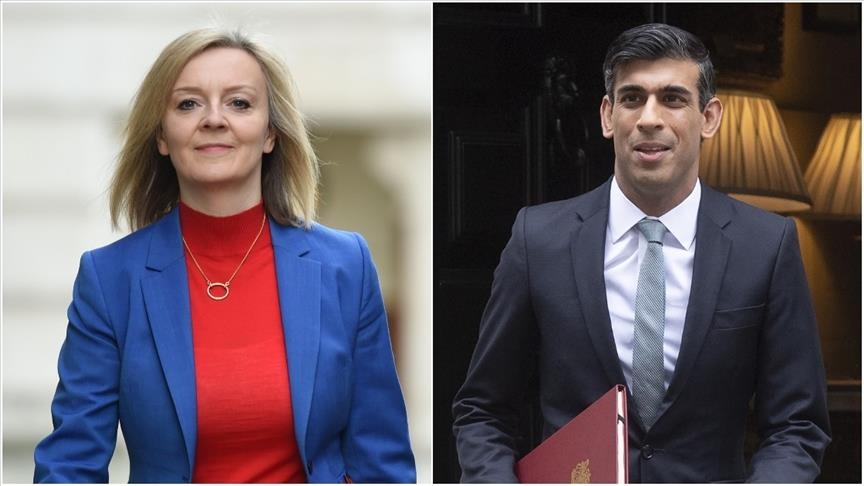
LONDON
Members of Britain’s ruling Conservative Party are currently voting to decide on their next leader, who will also become the next prime minister.
Former Chancellor of the Exchequer Rishi Sunak is facing off against Foreign Secretary Liz Truss. The race was triggered by Prime Minister Boris Johnson’s resignation following a series of scandals that critics said cast doubt on his integrity and suitability for office.
Truss is leading in internal Conservative Party membership polls by some margin, though Sunak led in the first stage of the contest with Conservative Party lawmakers.
Anadolu Agency interviewed three experts on British politics for their views on the leadership race.
Establishment politics
Michael Kandiah, a lecturer in Contemporary British History at King’s College London, told Anadolu Agency that it was “more than likely” that Truss will become prime minister.
He said Sunak had not made his case to the Conservative rank-and-file as effectively as Truss had.
“He’s much more the establishment candidate,” he added, pointing to the “increasing divide” between the Conservative parliamentary party and the grassroots.
Roger Mortimore, a professor of Public Opinion and Political Analysis at King’s College London, told Anadolu Agency that while Truss had the advantage as things stand, either candidate could still win.
“This is a politically-sophisticated electorate who will take account of the arguments they hear and of the impressions that the candidates are giving, and it is not too late for Rishi Sunak to catch up if he should prove more convincing over the next couple of weeks,” he said.
Mortimore said Truss’ advantage lied in her proposed policy of cutting taxes, and in that Sunak was blamed for Johnson’s resignation.
He said that Sunak’s best hope lied in his economic case that now is the wrong time to cut taxes due to rising inflation.
He added that all credible candidates were inevitably part of the party establishment, as there was “no substantial dissident faction in the party with a different policy agenda.”
Johnson’s shadow
Johnson’s shadow looms large over the leadership race, and Kandiah agreed that a major issue facing Sunak is his perceived role in toppling Johnson, as well as his perceived arrogance by some.
Kandiah added that while the parliamentary party was largely unwilling to let sleeping dogs lie – they were the ones to force him from office after all – the party rank-and-file saw the outrage over Partygate as being led more by the media than the wider electorate, as well as seeing a large dose of hypocrisy.
“What they would have much preferred is that they could have voted him out,” Kandiah said. “I think that’s really where the problem lies.”
Truss has aligned herself closely with Johnson, while Sunak has made clearer his ethical and economic disagreements with the prime minister.
Mortimore said that Johnson was dislodged because of “personal and leadership” issues rather than policy ones.
Conservative members “would not have pushed him out if he had not been damaging the reputation of the party and the government with personal failures and misjudgments,” he said.
End of an era?
“A week’s a long time in politics,” Kandiah said, as he began exploring the issue of whether a simple change in leadership would be enough to give the Conservatives a fighting chance of winning the next general election, which has to take place by 2024.
He was not particularly sanguine. Johnson was handed his enormous majority in 2019 by so-called Red Wall voters, former Labour voters who backed Brexit in 2016 and then Johnson three years later. Though they are older and more socially conservative, like the Conservatives’ core affluent voters, they are also to the left economically owing to their living in more deprived parts of the country.
“It’s very difficult to see them coming back for a whole variety of reasons,” Kandiah said.
Red Wall voters are among the most hard-hit by a wave of problems plaguing the government, not least the skyrocketing cost-of-living-crisis and surge in energy bills. Immigration is also a consistent concern for all Conservative voters.
“If voters are able to see that they’ve been able to do something genuine about it, that might change,” Kandiah said. “The problem really is I don’t see that happening. It’s very difficult to see another leader, simply a new face, changing the results in the medium-term, which is really what the next general election is.”
Mortimore said it all hinges on how the new leader performs until the next election.
Labour may be ahead in the polls, but their victory is not a foregone conclusion, he said, because other governments in the past have recovered from similar deficits in the polls. The key issue would most likely be the country’s economic recovery.
“The new leader has to find a way of keeping both those groups happy, or of conjuring up millions of new supporters to replace the ones who are unhappy and won’t vote Conservative again. If he or she can’t do that, they will be entirely dependent on hoping that Labour will be incompetent enough to miss an open goal,” Mortimore said.
Race and gender
The makeup of the leadership race has drawn widespread media interest, as one candidate is an ethnic minority and the other a woman. The left often sees itself as more progressive on issues of racial and gender justice than the right.
“It was always assumed that the left would be a place where racial minorities would feel more comfortable,” Kandiah said.
He added that there is a growing divide within Britain’s various ethnic minority groups, with South Asians for example beginning to be drawn more to the Conservatives than Labour.
“Even within the broader Conservative Party itself, race is not seen to be an issue,” Kandiah said. “They’ve done plenty of opinion polling of ordinary Conservative voters, and they don’t see this as a big issue. What’s also very interesting about having a woman (is that) because they’ve had two prime ministers who were women in the past, that is not seen to be a problem. So it’s not that it’s an advantage, it’s not a problem.”
“It’s an interesting social development and it’s an interesting historical development,” he said.
Mortimore said that gender was no issue in the election as “Margaret Thatcher is still widely revered by party members.”
He added that race was not an issue either.
“Certainly until a few years ago, it would have been very surprising to see a member of an ethnic minority being seriously considered as a Conservative leader, but I don’t think that is true anymore,” he said.
He continued by saying that the last few Conservative governments had more ethnic minority ministers than any previous government of any party and that Conservative members do “now seem to be comfortable with that.” Sunak himself was a very popular Chancellor until events led to his poll ratings falling, he added.
“If he loses, I’m sure it will not be because Truss is white and he is not,” Mortimore said.
Emilia Belknap, a PhD candidate in gender and politics at the University of Edinburgh, also discussed the racial and gender makeup of the Conservative leadership race with Anadolu Agency.
Belknap said that both previous women prime ministers have been Conservative, a fact used by them to “substantiate their mission for gender equality within the party.”
She added, however, that these claims come into question in terms of policy measures and the treatment of women candidates within the party, such as with maternity leave.
“If Liz Truss wins the competition, she will be the country’s third Tory (Conservative) British prime minister. If Rishi Sunak wins, he will be the UK’s first person of color standing in the premiership,” Belknap said.
Citing academic research in this field, she highlighted the difference between substantive and descriptive representation.
“In the context of the Tory leadership race, while Truss and Sunak both are members of minority groups in politics, it is crucial to place more importance on what they do for the groups they are a part of (women or people of color) as opposed to only giving recognition to what they look like. It is important that political leaders are substantive in terms of equality,” she said.
The new leader of the Conservative Party, and in turn prime minister, will be announced on Sept. 5.
Anadolu Agency website contains only a portion of the news stories offered to subscribers in the AA News Broadcasting System (HAS), and in summarized form. Please contact us for subscription options.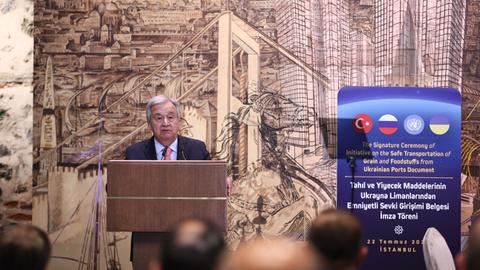

UN Secretary-General Antonio Guterres has thanked Türkiye for its efforts and leadership as a nascent deal to resume grain exports from Ukraine saw its first ship depart from the port of Odessa.
The departure of the Sierra Leone-flagged dry cargo ship Razoni marked an "important starting point" for the agreement, Guterres said on Monday.
"It must be the first of many commercial ships bringing relief and stability to global food markets," he added.
"Today's departure is an enormous collective achievement by the Joint Coordination Center, set up last week in Istanbul under United Nations auspices, with representatives from Ukraine, the Russian Federation, and Türkiye," the UN chief told reporters.
"Ensuring that grain, fertilisers, and other food-related items are available at reasonable prices to developing countries is a humanitarian imperative. People on the verge of famine need these agreements to work in order to survive," he said.
Joint Coordination Center in Istanbul to inspect all grain ships leaving Ukraine to ensure they aren't carrying any weapons pic.twitter.com/qacaoMhgwn
— TRT World Now (@TRTWorldNow) August 1, 2022
The Razoni is due to arrive in Istanbul on Tuesday for an inspection under the historic Ankara-brokered agreement to facilitate grain and foodstuff exports. The vessel is bound for the Lebanese port of Tripoli in the country's north.
Türkiye, the UN, Russia, and Ukraine signed a deal on July 22 to reopen three Ukrainian ports — Odessa, Chernomorsk, and Yuzhny — for grain that has been stuck for months because of ongoing Russia-Ukraine conflict, which is now in its sixth month.
READ MORE: Türkiye inaugurates Joint Coordination Centre for Ukraine grain exports
First shipment welcomed
The European Union and NATO welcomed the grain shipment's departure as a "first step" towards easing the food crisis.
The agreements signed by Ukraine, Russia, Turkey & @UN are a critical step in overcoming the global food insecurity caused by Russia‘s aggression against Ukraine.
EU remains committed to help #Ukraine bring as much of its grain into global markets as possible.
Full Statement: https://t.co/fAC3vuh7nY
— Josep Borrell Fontelles (@JosepBorrellF) July 22, 2022
EU spokesperson Peter Stano, however, cautions the bloc still expects the "implementation of the whole deal and resumption of Ukrainian exports to the customers around the world."
NATO Secretary General Jens Stoltenberg said, Western allies "strongly support the full implementation of the deal to ease the global food crisis caused by Russia's war in Ukraine".
"I thank our Ally #Türkiye for its pivotal role," he continued in a tweet.
I welcome the 1st shipment of Ukrainian grain from Odesa under the @UN-brokered deal. I thank our Ally #Türkiye for its pivotal role. #NATO Allies strongly support the full implementation of the deal to ease the global food crisis caused by Russia’s war in Ukraine.
— Jens Stoltenberg (@jensstoltenberg) August 1, 2022
Ukrainian Infrastructure Minister Oleksandr Kubrakov said on Twitter that the first grain ship has left, adding: "Thanks to the support of all our partner countries & @UN we were able to full implement the Agreement signed in Istanbul."
The first 🇺🇦 grain ship since #RussianAggression has left port. Thanks to the support of all our partner countries & @UN we were able to full implement the Agreement signed in Istanbul. It’s important for us to be one of the guarantors of 🌏 food security. pic.twitter.com/jOz3bdmdfB
— Oleksandr Kubrakov (@OlKubrakov) August 1, 2022
Russia, for its part, said the first grain ship to leave Odessa was "very positive" news.
Kremlin spokesperson Dmitry Peskov said he hoped the agreement will be implemented by all sides.
"This is a good opportunity to test the implementation of the agreements that were agreed upon at the Istanbul talks," Peskov said.
READ MORE: First shipment of Ukraine grain leaves Odessa under Türkiye-brokered deal
Source: TRTWorld and agencies
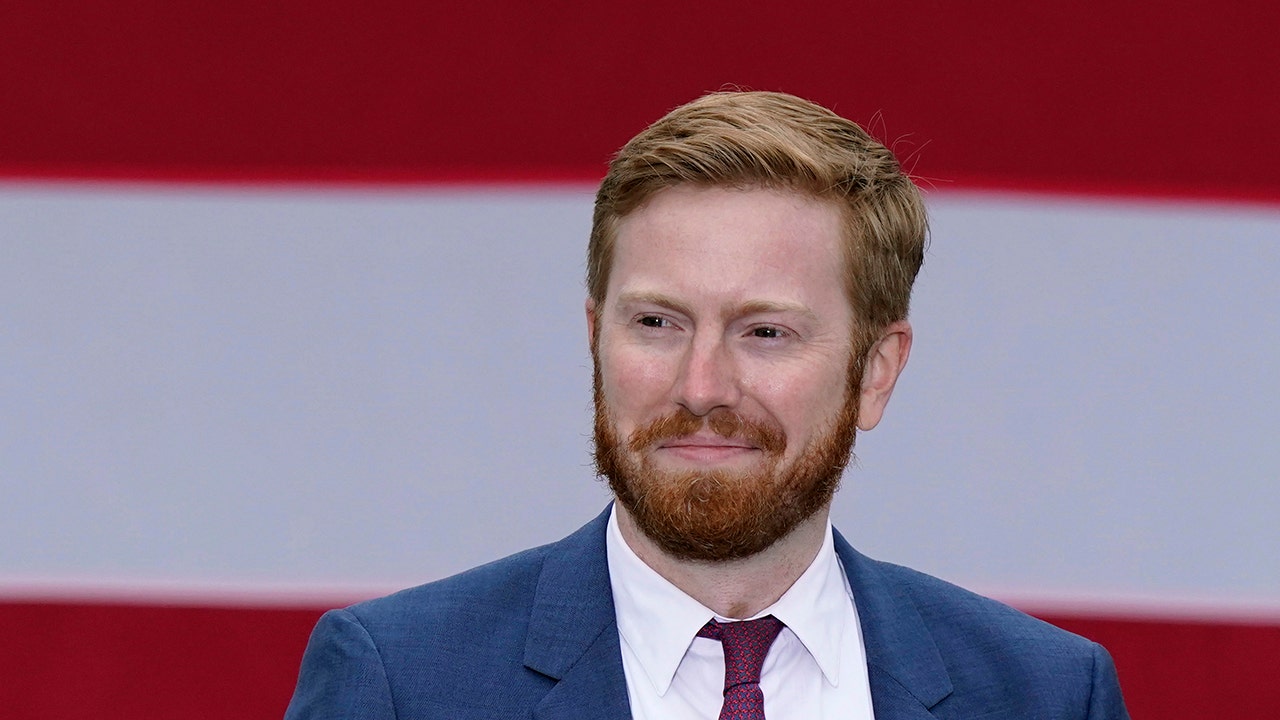
NEWYou can now listen to Fox News articles!
A left-wing group dedicated to electing progressives that is backed by "Squad" member Rep. Alexandria Ocasio-Cortez, D-N.Y., is targeting the national Democratic Party's leadership following recent attempts to meddle in a Republican congressional primary in Michigan.
"Democratic Party leadership will literally support Republicans before they start supporting progressives," Justice Democrats wrote in a Wednesday morning tweet that included a report detailing spending by the Democratic Congressional Campaign Committee (DCCC) to boost the Trump-backed challenger to incumbent Rep. Peter Meijer, R-Mich.
The DCCC told Fox News on Monday that it plans to spend $425,000 on a new ad buy to boost Republican challenger John Gibbs against Meijer, who was one of the 10 House Republicans that voted to impeach former President Donald Trump following the Jan. 6 storming of the U.S. Capitol.
The ad buy appears to be an effort by national Democrats to help Gibbs win the primary in hopes of setting up a more favorable general election showdown for Democratic candidate Hillary Scholten, who is running unopposed in the primary.
HERITAGE ACTION AD CAMPAIGN PRESSES VULNERABLE DEMOCRATS TO OPPOSE ‘BUILD BACK BETTER’ AGENDA
The Justice Democrats' reaction to the DCCC's involvement in the race highlights the continued divide between progressives and moderates in the party that have consistently clashed over various policy points and campaign strategy each election cycle.
Moderate Democrats have, however, continued to largely defeat their progressive challengers in primaries across the country this year as the party fights to minimize what many expect to be a victory for Republicans in November.
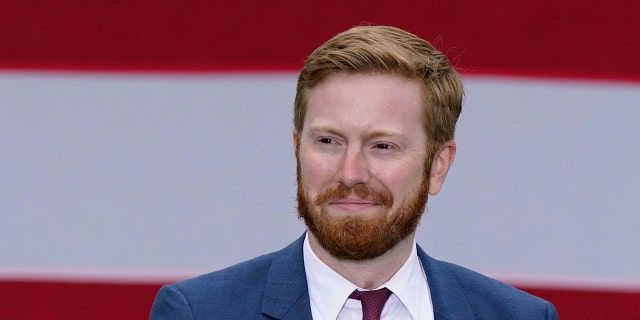
Michigan's 3rd District Congressional Republican candidate Peter Meijer speaks at a campaign rally on Oct. 14, 2020, in Grand Rapids, Mich. (AP Photo/Carlos Osorio)
CLICK HERE TO GET THE FOX NEWS APP
Fox News Digital reached out to the DCCC and Justice Democrats for comment but did not receive a response.
Fox News' Paul Steinhauser contributed to this report.
Brandon Gillespie is an associate editor at Fox News. Follow him on Twitter at @brandon_cg.


KABUL: A delegation of Pakistani scholars on Tuesday met with members of the banned Tehreek-e-Taliban Pakistan (TTP) in Kabul. The delegation left for Afghanistan from Islamabad on Monday after receiving an invitation from the Islamic Emirate of Afghanistan.
Sources said that the delegation representing TTP was led by Mufti Noor Wali Mehsud, while the Pakistani delegation is headed by Mufti Taqi Usmani.
TTP’s delegation informed scholars about the obstacles encountered during their negotiations with Pakistani authorities, sources shared.
Sources further added that the delegation from Pakistan listened to TTP’s reservations and also shared their point of view with them.
Pakistani scholars will also meet with the leadership of the Islamic Emirate of Afghanistan during their visit. Other scholars in the delegation include Hanif Jalandhari, Maulana Tayyab Punj Mir, Molvi Anwaar-ul-Haq, and Mufti Ghulam-ur-Rehman.
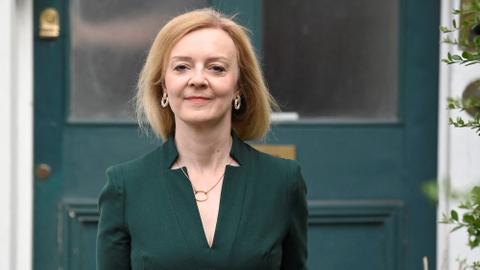

Liz Truss, the leading candidate to succeed Boris Johnson as British prime minister, promised to scrap all remaining European Union laws that still apply in Britain by 2023 if she wins the Conservative Party leadership contest.
Foreign Secretary Truss is up against former finance minister Rishi Sunak in a race to court the 200,000 members of the Conservative Party who over the course of the summer will vote to choose the country's new prime minister.
Britain's relationship with Europe remains of great concern to the Conservative Party membership, generally characterised as more eurosceptic than the wider population.
Hoping to tap into that, Truss, who campaigned for 'remain' in the 2016 referendum but is now seen as the heir to Johnson's pro-Brexit position, promised to purge all remaining EU laws from the statute books.
To avoid uncertainty and confusion as Britain untangled itself from the EU after 40 years of membership, the government automatically carried over thousands of EU laws and regulations into British law so that they would still apply after Brexit.
"EU regulations hinder our businesses and this has to change," Truss said in a statement. The statement said she was setting out her credentials as the "Brexit delivery" prime minister.
"In Downing Street, I will seize the chance to diverge from outdated EU law and frameworks and capitalise on the opportunities we have ahead of us."
Sunak: UK faces national emergency on 'five fronts'
Separately, Rishi Sunak, in the running to become the next prime minister, would put the government on a crisis footing from "day one" of taking office, he said in an interview with The Times on Friday.
Over the next week, Sunak intends to argue that Britain is facing a national emergency on five fronts including the economy, the National Health Service and migration, the newspaper reported.
Inflation is the "number one challenge we face," Sunak told the newspaper, adding that under Truss' plans, interest rates in the country could rise significantly.
Sunak has said he plans to cut taxes but only once inflation - now running at almost 10 percent — is brought under control. He accused his rivals of making "fairy tale" promises about tax cuts.
The government has already set out its intention to replace or repeal existing EU laws but had not set a timeframe.
Truss's deadline of 2023 is earlier than a similar pledge made by Sunak, who campaigned for Brexit in 2016 but has been vilified by some corners of the Conservative Party for raising taxes to their highest level in decades.
Sunak said EU law would be scrapped or reformed by the next election, which is expected in 2024. Truss leads Sunak by 62 percent to 38 percent among Conservative Party members, according to a YouGov poll on Thursday.
Source: Reuters